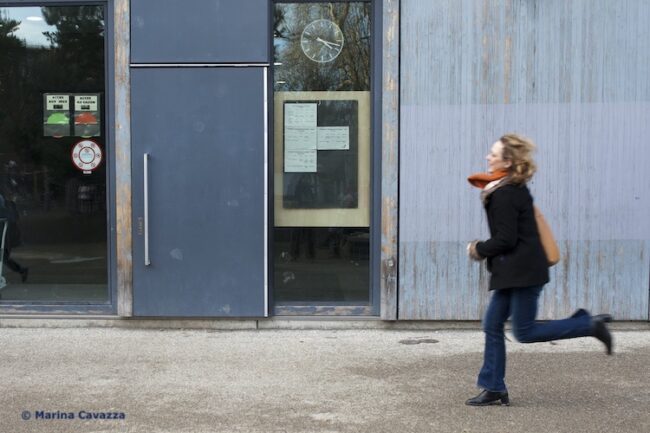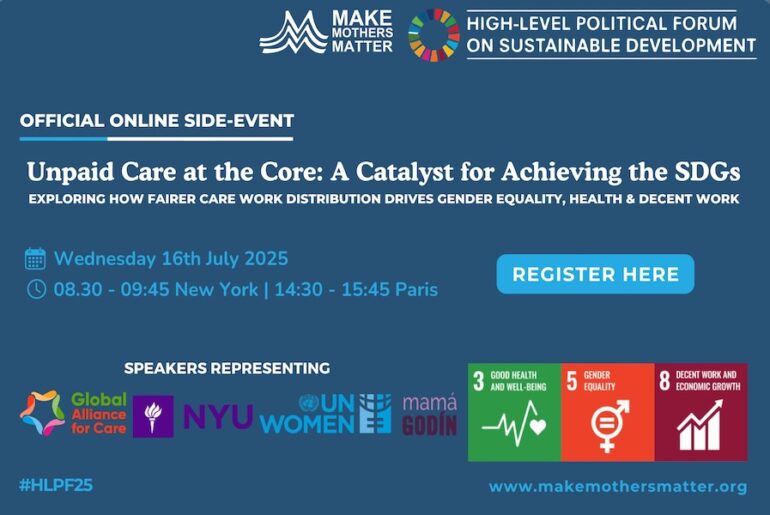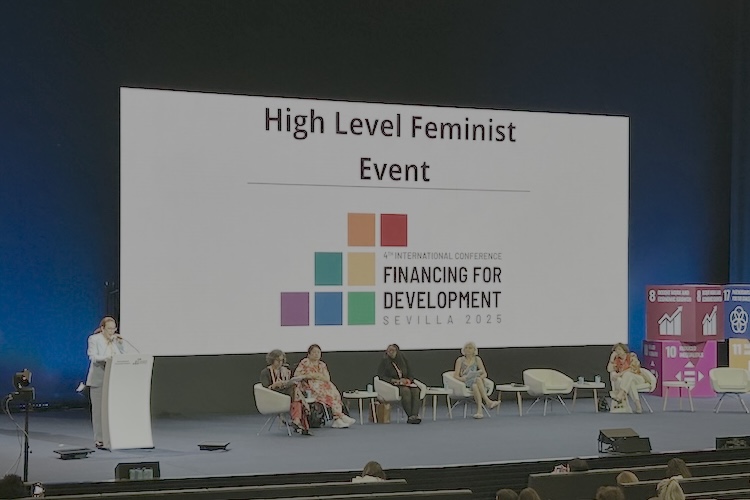From local to global: practical solutions to better support mothers
16.12.24
UN Geneva - The working group on discrimination against women and girls has requested input on care policies and programmes worldwide. In addition to highlighting examples of good laws, policies and practices that recognise and support unpaid caregivers, MMM, in its response, recalls that mothers are particularly impacted by their caring responsibilities in all aspects of their lives and that they ought to be properly accompanied.

The UN working group on discrimination against women and girls is preparing a report on the gendered dimensions of care and support. To inform this report, we have responded to the questions addressed in their call for input and provided information on existing good practices in terms of policies and programs at the international, regional, national and local levels.
While the Covid-19 pandemic uncovered the critical role of both paid and unpaid care work, global policies continue to lag behind in terms of addressing the economic and social penalties that caregivers face. Our societies and economic policy-making continue to prioritise growth over care and well-being.
Still, several countries are more advanced, in particular in Latin America, and offer possible paths forward and interesting examples to build on.
Examples of good care policies
- At legislative level, Ecuador has enshrined in its Constitution the right to care which entails protection for both caregivers and care receivers. At the municipal level, care is also getting recognition as a right in the City of Mexico, which has enshrined this right in its Constitution.
- Thinking holistically must be the response to the current care crisis. It is necessary to work across sectors, considering care in economic, labour, health and education policies. This is what several Latin American countries have done by developing national care systems involving different ministries. Uruguay was the first in 2015 to build a National Integrated System of Care to develop care services, improve the training of care providers and induce a cultural transformation of society. Other countries like Argentina and Chile are following suit.
- At the local level, municipalities are also key players in developing new solutions. Colombia’s capital Bogota is a good example with its ‘Care Blocks’ around the city, which are designed to make all essential care-related services accessible, provide relief to caregivers and support them in their caregiving responsibilities.
- Child care policies are key to supporting mothers, and as part of our answer we welcome the revision of the EU ‘Barcelona targets’ which came with the 2022 EU Care strategy. However, not only should quality childcare be accessible to all families, but policies should also ensure that it is not limited to creche, and instead offer various solutions to address the diversity of family needs. Early childhood in particular is a key period during which accompaniment by parents and childcare professionals need to be secured. Still, in many countries, the cost of childcare remains too high to allow every household to choose to resort to it or not. It therefore often condemns mothers to stay at home to compensate for insufficient public services.
- Ensuring that young children receive quality care also starts with providing properly remunerated maternity, paternity and parental leave to support parents assume their care responsibility during the critical early months of the child. The 2019 EU Work Life Balance Directive provides a first step in the right direction by obliging member states to introduce a minimum of 10 working days of paternity leave, an important lever to induce a more equal sharing of care responsibilities within families.
However, we at MMM believe that maternity protection should be granted to all mothers without conditionality, whereas it is usually linked to formal employment. As a result, nearly half of mothers with newborns do not receive maternity cash benefits. This gap has to be addressed because it can put mothers – and their children – in precarious situations.
Promising initiatives
Lone mothers are particularly vulnerable to poverty because the unpaid domestic, care and educational work they shoulder on their own limits their ability to dedicate enough time to a formal paid activity. They ought to benefit from tailored support. As an example of good practice, the municipality of Ris Orangis in France has created a municipal status for single parents that provides specific rights and benefits to facilitate their daily lives and their access to childcare, employment and housing.
To facilitate mothers’ access or return to work, a promising avenue is the recognition and validation of the skills that they gain through caring for and educating their children. The MAV project (Mom Virtual Assistant Project) is an EU initiative which is a good example to build on: it not only helps mothers acquire new digital and entrepreneurial skills, but also leverages the unique soft skills they have gained through motherhood to empower and elevate them professionally.
Last but not least, our answer to the call for input also highlights good practices by our grassroots member associations. In particular, the Mothers Centres International Network for Empowerment supports mothers by providing spaces where they can meet, share experiences, help each other, and find relief and support. Many of our members also provide training and support to lone mothers in Morocco (Ahddane), Uruguay (Ceprodih), Spain (Fundacion Isadora Duncan), Kenya (Passion to Share Foundation) and the Netherlands (Single Super Moms).
These various examples of policies and programmes at the international, national and grassroots levels show promising pathways for progress. Decision-makers hold a responsibility in addressing the gendered dimensions of care, recognising that the well-being of caregivers and care receivers is the backbone of a healthy society and a functioning economy.
![]() Here’s our full answer to the call for input
Here’s our full answer to the call for input
Envisioning care as a common thread to global crises
29.07.24
UN New York - Our virtual HLPF side-event brought together experts to shed light on how the various global crises we face (in particular climate change and other environmental crises,
We call for multi-stakeholder approach to recognise and support unpaid care work
21.07.24
UN New York - Participating in the meeting of the UN Economic and Social Council (ECOSOC) on care and support systems, MMM reaffirmed the principle of co-responsibility, which should underpin
The New EU Gender Equality Roadmap : A Call for Inclusion of Mothers
04.03.25
The European Commission’s initiative on a new Gender Equality Roadmap post-2025, marks a significant step forward in addressing gender disparities across the European Union. Make Mothers Matter (MMM








